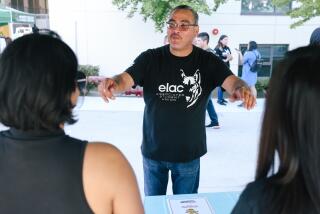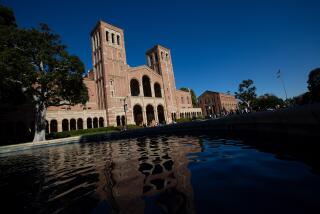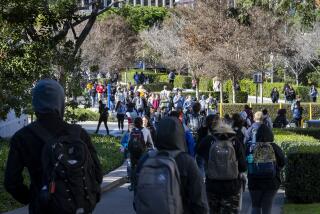Three UC campuses, Harvard, Princeton join growing coronavirus cancellations
- Share via
UC Santa Cruz and Whittier College on Tuesday joined a growing wave of colleges and universities across the country that are launching sweeping safety measures in response to the growing coronavirus outbreak, including the cancellation of in-person classes and several urging students to not return to campus after spring break.
As colleges turn to online learning for the remainder of the school year, many have also canceled admission tours and put tight restrictions on campus gatherings and travel.
UC Santa Cruz is the third University of California campus, joining Berkeley and San Diego, to suspend in-person classes and transition to online learning to reduce face-to-face interactions as much as possible. Whittier College officials said Tuesday that classes will be canceled on Friday at the 1,700-student campus and will resume online only after spring break on March 23.
San Jose State, San Francisco State and the private Santa Clara University are the largest California universities as of Tuesday that have made similar moves. UC San Diego decided to conduct online classes for the entirety of the spring quarter, which begins March 25. Scores of universities in the United States, Mideast, Asia and Italy have announced moves to online learning.
On the East Coast, Harvard and Princeton are urging students to stay home after their spring break, when classes will go online. In New York, Columbia University, Barnard and New York University are transitioning to online classes on Wednesday. A growing number of colleges, including Amherst College in Massachusetts, Ohio State University and Vanderbilt University in Tennessee, have taken similar actions.
The sweeping measures cut across core campus operations — including instruction, lab work, admissions and financial aid — as they confront the fast-moving global coronavirus outbreak. Caltech officials, citing an “abundance of caution in light of the quickly evolving COVID-19 situation,” announced cancellations of all on-campus visit programs indefinitely.
“The long-term results of the coronavirus will remain to be seen, but it’s clear that the short-term challenge is probably the greatest that higher education has faced in a generation,” said Ted Mitchell, president of the American Council on Education. “Every college and university is on a war footing about this and are trying to assemble as much information as possible.”
Mitchell said higher education has experienced such tumult only a few times in the last century. After 9/11, he said, widespread travel restrictions were initiated and some students were targets of racial and religious profiling. During the Vietnam War, many campuses were inflamed by antiwar protests and lost some students and faculty members to the military draft.
The Great Recession of 2008 financially sapped higher education, but the damage took place more gradually, with the University of California losing one-third of its state funding over three years, said Nathan Brostrom, who was UC chief financial officer at the time and now serves as interim chancellor at UC Merced.
The difference with the coronavirus, Brostrom said, has been the speed of its onslaught and the dramatic effect it is having across campus.
“Literally every time I look at my computer, something new is coming up,” Brostrom said. “The impact is felt on every part of campus operations. All we can do is continually prepare and be nimble in our responses.”
UC Merced’s all-in mobilization involves twice-daily meetings on emergency services and teleconferences with all UC campuses to share information and best practices. They review health updates and policies on travel and large gatherings. They nail down plans to continue instruction and research should the campus have to move to online learning. Merced has no confirmed cases of the coronavirus or even reports of potential exposure, and its classes are not affected for now.
In addition, the UC financial expert said he was starting to assess the costs of the coronavirus outbreak. Merced will pay for any extra costs to bring 21 students home early from study-abroad programs in Italy, South Korea and Japan. Already, the campus is paying for added expenses, such as mega-orders of hand sanitizer and extra campus cleanings.
And potential future costs loom. Merced could lose needed revenue if the campus cancels summer sessions. It could need to provide financial aid to the largely low-income student body if classes move online and obviate the need for federal work-study jobs on campus.
So far Berkeley, San Diego and Santa Cruz are the only campuses in the 10-campus University of California system to announce in-person class suspensions. At those campuses, classes that cannot be held remotely, such as laboratories and performing arts, will continue to meet.
Varsha Sarveshwar, a UC Berkeley senior and UC Student Assn. president, said she fully backed the decision and called on all UC campuses to consider similar action.
“It’s a really responsible decision on the part of the campus,” she said.
She added that the transition should not be too disruptive because Berkeley already began stepping up online learning last year when Pacific Gas & Electric shut off power during the Northern California wildfires.
At a UCLA student meeting Monday, officials said that they are paying close attention to public health reports but do not see a need at this time to suspend in-person classes or close dorms or dining halls.
Across town at USC, officials are preparing for a three-day test on online learning beginning Wednesday.
“We are preparing the university to make substantial changes in a very short period of time to ensure we have the capability to move online should stronger measures become necessary,” said Provost Charles F. Zukoski. “We are in uncharted territory, and we are being vigilant to protect our community.”
Except for San Jose and San Francisco State, the California State University’s 21 other campuses were are still holding in-person classes as of Tuesday, a university spokesman said. At Cal State Long Beach 10 students were in self-isolation, and at Cal State Northridge 13 students were isolating themselves after possible exposure at in Washington, D.C., last week.
At the California community colleges “all of our campuses are preparing for the possibility of a disruption and for moving students online,” Chancellor Eloy Ortiz Oakley said.
Sierra College in Rocklin, outside Sacramento, declared a “campus state of emergency” Sunday after two employees were possibly exposed to COVID-19 on a cruise. The employees, who do not work in classrooms, were on the same cruise as an elderly Placer County man who later tested positive for COVID-19 and died.
The college said faculty would begin providing instruction online Wednesday and must transition to remote instruction by March 18. Many lab classes will continue on site, and athletic competitions will proceed without spectators. All events and non-essential travel through the end of March were also canceled.
In the Los Angeles Community College District, officials have worked to debunk false rumors about coronavirus cases at three campuses. Five Pierce College students have been instructed to “self-monitor” their health after returning from a conference last week at which three other attendees not affiliated with the campus tested positive for COVID-19, said LACCD spokesman William Boyer. He said no students have shown symptoms of the illness that met public health agency standards for testing for the virus.
Times staff writer Sonali Kohli contributed to this report.
More to Read
Sign up for Essential California
The most important California stories and recommendations in your inbox every morning.
You may occasionally receive promotional content from the Los Angeles Times.















